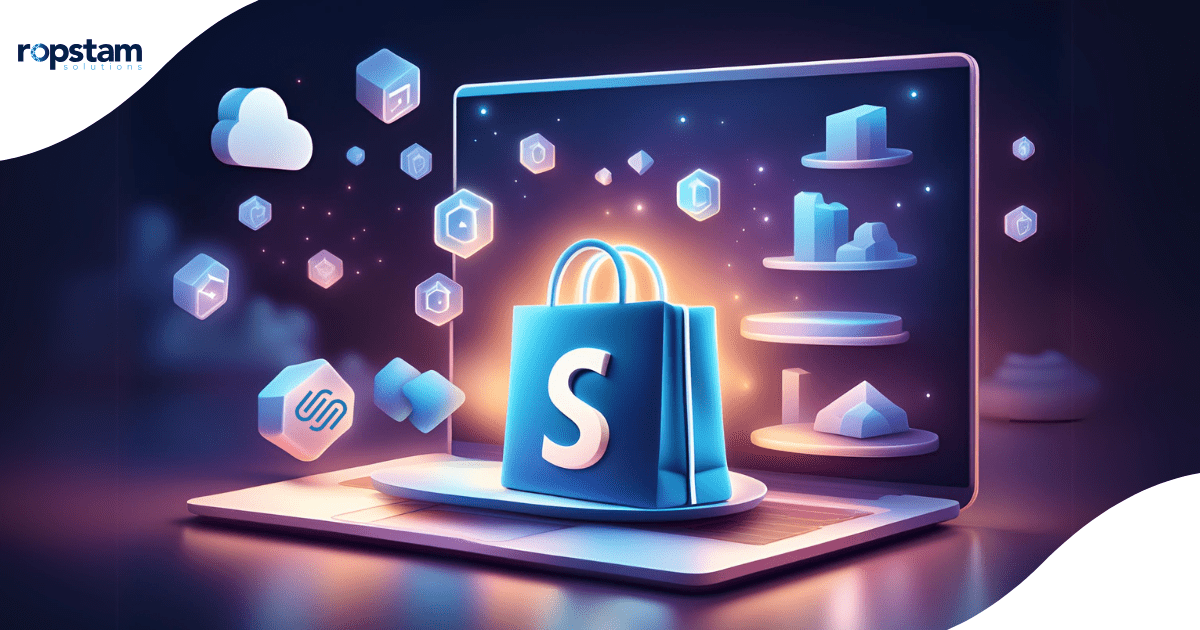Kickstarting the exciting journey of building your first Ecommerce store can be both exhilarating and overwhelming. With numerous website builders vying for your attention, selecting the ideal platform to bring your online retail dreams to life can be a daunting task.
Two of the most popular contenders in this domain are Shopify and Squarespace. While both of these nifty platforms share the common goal of setting up online stores to advertise your products, they cater to different needs and vary in their user experiences.
As a budding Ecommerce entrepreneur, understanding the strengths and weaknesses of each platform is crucial to making an informed decision. In this comprehensive guide, we’ll delve into the world of Shopify and Squarespace underlining the pros and cons of each platform to help you make the right decision. So, without further ado, let’s dig into the Shopify vs Squarespace debate.
What is Shopify?
At its core, Shopify is more than just a sophisticated application for selling products online – it’s a comprehensive platform designed to revolutionize the way businesses approach Ecommerce. By integrating website building, content management, and robust sales tools, Shopify allows you to convert your Ecommerce visions into hugely successful online stores.
But that’s not all. What sets Shopify apart from other well-known Ecommerce solutions is its ability to serve as a standalone website builder, capable of building a professional online presence from scratch. This all-in-one approach eliminates the need for third-party integrations, simplifying the setup process and allowing businesses to focus on what matters most – growth and customer satisfaction.
Key Strengths of the Shopify Platform
- End-to-End Solution: From website design to inventory management, Shopify provides a cohesive ecosystem for managing every aspect of your eCommerce business.
- User-Friendly Interface: User-friendly dashboards and enhanced workflows ensure that entrepreneurs of all skill levels can navigate and optimize their online stores with ease.
- Scalability & Flexibility: Whether you’re just starting out or experiencing rapid growth, Shopify’s adaptable infrastructure supports your evolving needs, ensuring an effortless transition between stages.
- Extensive App Store & Integrations: Shopify enables you to enhance your store’s functionality with a vast array of third-party apps and integrations, covering everything from marketing and shipping to accounting and customer service.
What is Squarespace?
As a popular Ecommerce website builder, Squarespace stands out as a versatile and innovative solution that marries website building with online store functionality. While not exclusively designed for Ecommerce, Squarespace’s adaptability and user-centric approach have caught the eye of a wide audience, from entrepreneurs to influencers.
So, what does it mean for your business? If you are planning to launch your personal online store to sell your products to a wider audience at an affordable price, Squarespace is an extremely useful option that is hard to simply ignore.
Shopify vs Squarespace: Factor-wise Comparison
Expanding the Shopify vs Squarespace debate, here is a comparison of both platforms in full detail:
- Library of templates
- Pricing
- Ease of Use
- Number of Products
- SEO
- Integrated Payment Methods
- Social Media Marketing
- Customer Support
- Inventory Management
1. Library of Templates
- Shopify: Boasts an impressive library of over 100 free and paid themes, catering to various industries. These templates are highly customizable, ensuring a unique storefront. Shopify’s theme store is regularly updated with new, trendy designs.
- Squarespace: Offers around 60 sleek, modern templates, primarily focusing on aesthetics. While highly customizable, the options might seem limited compared to Shopify. However, Squarespace’s templates are renowned for their sophisticated, design-forward approach.
- Comparison Edge: Shopify’s vast and diverse template library gives it an edge for users seeking a wide range of options.
2. Pricing
Shopify:
- Basic Shopify: $29/month (online credit card rates: 2.9% + 30¢ per transaction)
- Shopify: $79/month (reduced online credit card rates)
- Advanced Shopify: $299/month (further reduced rates for large businesses)
Squarespace:
- Personal: $14/month (limited to one contributor, no e-commerce)
- Business: $23/month (3% transaction fee)
- Basic Commerce: $27/month (no transaction fees, basic commerce features)
- Advanced Commerce: $49/month (advanced commerce features)
Comparison Edge:
Squarespace offers a more affordable entry point, but Shopify’s Ecommerce-focused plans might be more cost-effective for growing online stores.
3. Ease of Use
- Shopify: Designed with e-commerce in mind, Shopify offers an intuitive interface for setting up and managing an online store. Features like drag-and-drop store builders make it accessible to newcomers.
- Squarespace: Known for its user-friendly, visually oriented platform. While excellent for content and design-focused sites, the e-commerce aspects can be slightly more complex to navigate than Shopify.
- Comparison Edge: Shopify is generally more straightforward for Ecommerce newcomers, but Squarespace’s learning curve is still manageable.
4. Number of Products
Shopify:
Offers unlimited products across all plans, making it ideal for large inventory businesses.
Squarespace:
- Business Plan: Limited to selling a single product/service (not ideal for multi-product stores)
- Commerce Plans: No product limits, but the Basic Commerce plan has limitations on features, not products.
Comparison Edge:
Shopify, for its straightforward unlimited product policy across all e-commerce plans.
5. SEO
- Shopify: Provides built-in SEO features (customizable URLs, meta tags, etc.) and supports SEO apps for enhancement.
- Squarespace: Also offers robust built-in SEO tools (URL customization, SEO descriptions) and is highly optimized for search engines.
- Comparison Edge: Both are strong, but Squarespace’s design-focused approach can lead to inherently more SEO-friendly site structures.
6. Integrated Payment Methods
- Shopify: Supports over 100 payment gateways worldwide, including Shopify Payments.
- Squarespace: Integrates with major payment processors (Stripe, PayPal, Apple Pay)
- Comparison Edge: Shopify, due to its vast global payment gateway support.
7. Social Media Marketing
- Shopify: Offers direct integrations with major platforms (Facebook, Instagram) for product tagging and shopping.
- Squarespace: Enables flawless integrations with social media for content sharing, but Ecommerce integrations are more limited.
- Comparison Edge: Shopify, for its robust e-commerce-focused social media integrations.
8. Customer Support
- Shopify: 24/7 support via phone, email, and live chat, plus extensive community forums.
- Squarespace: Offers 24/7 email and live chat support, with extensive online resources but no phone support.
- Comparison Edge: Draw
9. Inventory Management
- Shopify: Includes robust inventory management features, with alerts and automatic updates.
- Squarespace: Provides basic inventory tracking, but it’s more suited for smaller product lines or can be enhanced with third-party apps.
- Comparison Edge: Shopify, for its built-in, scalable inventory management capabilities.
The Verdict
In the universe of Ecommerce website builders, Shopify and Squarespace stand out as two behemoths, each boasting unique strengths. As you weigh your options, consider the scope of your online store, project budget, desired customization, and scalability needs. Align these factors with the platforms’ distinct features to make an informed decision, ensuring your e-commerce vision thrives with the perfect foundational partner













